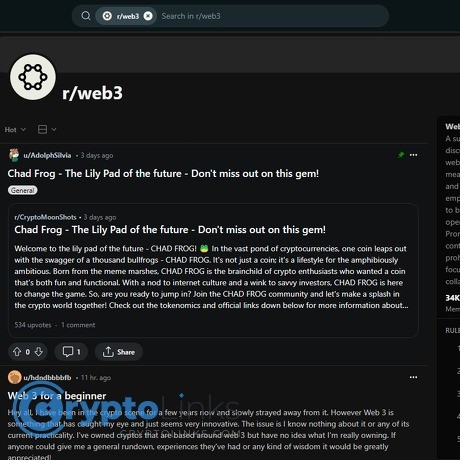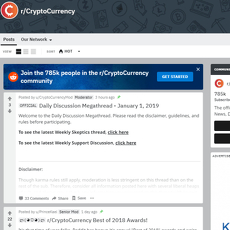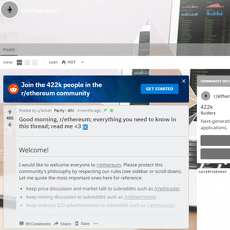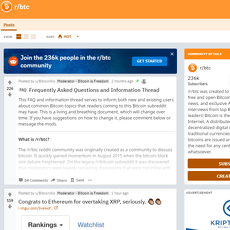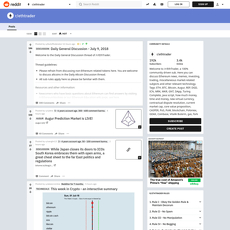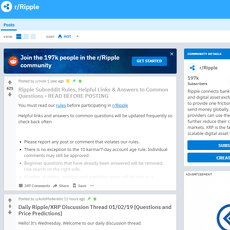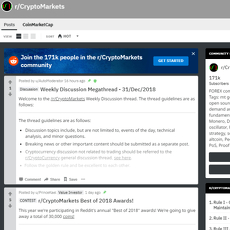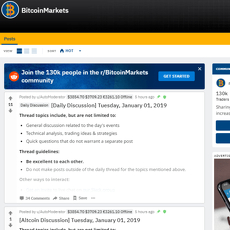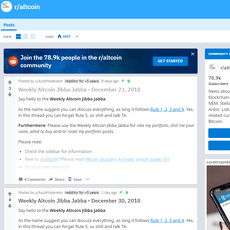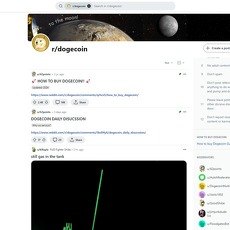r/Web3 Review
r/Web3
www.reddit.com
r/Web3 Reddit Review Guide: How to Use This Community Without Getting Wrecked
Ever opened r/Web3, scrolled for five minutes, and thought, “Is any of this actually helping me, or am I just getting farmed for attention?”
If that sounds familiar, you’re not alone.
r/Web3 is one of those places that sits right on the edge between “this could level up my Web3 knowledge” and “this is going to waste my evening and maybe my money.”
In this guide, I want to pull that confusion apart and show you what r/Web3 is genuinely good for, where it completely fails you, and how to use it without getting wrecked by hype, scams, or bad advice.
The main problems users have with r/Web3 (and Web3 in general)
If you ask most people what they think of r/Web3 after their first week on it, you’ll usually hear some version of this:
- “It’s just memes and shills.”
- “Everyone talks like I already know everything.”
- “I can’t tell what’s real and what’s marketing.”
- “I came to learn Web3, but now I’m more confused than before.”
Let’s break down why that happens.
Problem 1: r/Web3 feels like a mash-up of memes, buzzwords, and shilling
Open the subreddit on any random day and you’ll probably see:
- A project post claiming to be “revolutionizing decentralized identity”
- A meme about “Web2 boomer companies” not getting it
- A question from a confused beginner about “how to get started in Web3”
- A long thread arguing about whether some chain is “real Web3” or just marketing
On paper, it sounds like variety. In practice, it can feel like noise.
The problem is that a lot of posts use the same vague language:
- “Changing the future of the internet”
- “True ownership for everyone”
- “Next-gen decentralized ecosystem”
but with no clear explanation of what actually exists today versus what’s just a pitch deck fantasy.
So you get a feed that looks busy, active, exciting… yet when you step back and ask “What did I actually learn in the last 20 minutes?” the answer is often “nothing I can actually use.”
Problem 2: It’s hard to separate legit projects from obvious (and not-so-obvious) scams
Web3 has built-in risk: tokens, contracts, wallets, anonymous teams. Reddit adds another layer: anonymous users, low posting cost, and karma that can be farmed or faked.
On r/Web3 you’ll regularly see posts that look like this:
- Brand-new account, first ever post, sharing “an amazing new protocol I just found, no presale, guaranteed airdrop soon”
- Threads where half the comments are low-effort “Bullish!” or “This will 100x” from accounts with almost no history
- Project announcements with no docs, no GitHub, no real team links, but lots of flashy graphics and token tickers
Some of these are obvious scams. Some are just low-quality projects that will never ship. A few might be real but badly presented. The issue is: you can’t tell at a glance.
Research from groups like Chainalysis and various crypto security firms has repeatedly shown that social platforms (Telegram, Discord, Twitter/X, and yes, Reddit) are common starting points for scams. Threads promising “airdrop guides,” “new chains,” or “yield strategies” regularly lead to phishing sites or malicious contracts.
So if you treat r/Web3 as a trusted source, you’re basically walking into a flea market with your wallet open. That doesn’t mean everything is fake—but you can’t assume anything is safe just because it’s upvoted.
Problem 3: Most people don’t really know what “Web3” means
Here’s another hidden issue: lots of r/Web3 confusion comes from the fact that “Web3” itself is a fuzzy word.
On the subreddit, you’ll see people use “Web3” as if it’s interchangeable with:
- Crypto
- Blockchain
- NFTs
- DeFi
- DAOs
- Metaverse
When, in reality, these are overlapping but different things.
Some users mean “Web3” as:
- Any app where you connect a wallet
- Any project with a token
- Anything not Bitcoin
Others mean it more conceptually:
- “The next version of the internet where users own their data and assets”
- “A stack of decentralized protocols—identity, storage, finance, social—that replaces Web2 platforms”
This mismatch creates friction in threads. You’ll see people talking past each other, arguing not just about projects but about definitions. Newcomers get thrown into those arguments without realizing that half the debate is just about what “Web3” even stands for.
If you’ve ever read a thread and thought, “Wait, are we even talking about the same thing?”—you’re picking up on that gap.
Problem 4: Newcomers feel intimidated by the technical talk and tribal drama
r/Web3 isn’t as technical as developer-only subs, but it’s still a rough first stop if your background is purely Web2 or non-technical.
Typical comment chains may include:
- “Just verify the contract on Etherscan and check the proxy pattern.”
- “This is clearly just an L2 with optimistic rollup and centralized sequencer, not real Web3.”
- “Without zk-proofs and native account abstraction, this UX is dead on arrival.”
If you’re still figuring out what a wallet is, that language might as well be a foreign alphabet.
On top of that, you have chain tribalism: people fiercely defending their favorite ecosystem (Ethereum, Solana, Base, whatever’s hot this month) and downvoting or mocking anything that doesn’t align with their narrative.
So a newcomer posts a basic question like:
“Is Web3 just NFTs and DeFi, or are there real apps people use daily?”
and the replies split into:
- Helpful explainers from patient users
- Overly technical posts that assume too much knowledge
- Tribal arguments about which chain is “winning”
That mix can make a beginner feel stupid fast, even though the real problem is not them—it’s the way the conversation is structured.
Problem 5: Threads that eat your time vs threads that actually level you up
Another big issue: not all “popular” content is useful, and r/Web3 is no exception.
Some of the most engaging threads are:
- Drama: “X project rugpulled”, “Y founder called out”, “Z chain is fake decentralization”
- Speculation: “Will this project 100x?”, “Is [New Chain] the future?”
- Vibes-only: “Web3 is dead / Web3 is the future” with no nuance
These threads attract tons of comments and upvotes because they press emotional buttons: fear, greed, tribal loyalty, cynicism. But when you close Reddit afterward, you haven’t gained any skill, knowledge, or framework. You just burned energy.
Compare that with the rarer but hugely valuable posts:
- A founder sharing a detailed breakdown of what went wrong in their protocol launch
- A developer walking through how they shipped a feature using a specific Web3 stack
- A thoughtful discussion on real user adoption, not price charts
Those posts may get fewer upvotes, but if you’re trying to learn, build, or invest smarter, they are pure gold.
The problem is: they’re harder to find, especially if you don’t know what to look for or how to filter.
What people really want from r/Web3 but rarely get
So if the experience is this chaotic, why do people keep coming back to r/Web3?
Because under the noise, most users want something very specific—and r/Web3 promises it, at least on the surface.
Here’s what most people are actually hoping for.
They want simple explanations, not word salads
People come to r/Web3 searching for posts like:
- “Explain Web3 to me like I’m new but not stupid.”
- “What are realistic Web3 use cases beyond trading and speculation?”
- “How do I go from zero to building something small in Web3?”
They don’t want generic “Web3 will change everything” posts. They want clear, practical breakdowns:
- How wallets work vs Web2 logins
- What “on-chain identity” actually means in practice
- Why gas fees exist and what layer 2s actually fix
r/Web3 occasionally delivers this through long-form comments or explainers from experienced users. But those posts are scattered and hard to find in between memes, shills, and repetitive questions.
They want clear learning paths, not random bits of information
Another big expectation: a roadmap.
People don’t just want content; they want direction. For example:
- If they’re non-technical: “What should I learn first? Wallets? Security? Basic DeFi?”
- If they’re developers: “Should I learn Solidity, Rust, something else? Where do I start?”
- If they’re curious investors: “How do I research projects properly in Web3 without getting scammed?”
Reddit in general isn’t built for structured learning, and r/Web3 is no exception. You get scattered tips, one-off threads, and random advice, but rarely a clear A → B → C path that says:
- “Step 1: Understand these basics.”
- “Step 2: Use these resources.”
- “Step 3: Try this simple thing in the real world.”
So people end up with bookmarks, saved posts, and half-remembered comments—but no system to actually progress.
They want early but trustworthy signals about projects and trends
This is a big one.
Many users check r/Web3 because they hope it will help them:
- Spot promising new tools, projects, or protocols before they blow up
- Notice when a specific sector (DeFi, NFTs, gaming, social, infra) is heating up
- Catch red flags about a project before they put real money into it
In other words: they want signal, ideally early and accurate.
What they often get instead is:
- Marketing disguised as “community discovery”
- Vague posts about “game-changing” tech with no code, docs, or product
- Low-effort questions like “Is [token] a good buy?” with equally low-effort answers
This is where r/Web3 can be actively dangerous if you don’t have a solid process. The subreddit can absolutely help you notice which narratives and projects are gaining attention—but it’s terrible at telling you which of those are actually worth your time or money.
The key is learning how to treat r/Web3 as a radar, not an oracle. That’s a concept we’ll keep coming back to.
So what will actually help you?
If you’ve been nodding along so far, you’re probably thinking:
“Okay, I get the problems. But how do I actually use r/Web3 without getting buried in nonsense?”
That’s exactly what this guide is built to fix.
Here’s what you can expect to get out of it going forward:
- Ways to quickly tell whether a thread is worth reading or ignoring
- A mental checklist for spotting low-quality project posts vs serious builds
- Strategies to use r/Web3 differently depending on whether you’re learning, building, or investing
- Ideas for combining what you see on r/Web3 with safer, more structured resources
But before any of that works, there’s one big thing we need to clear up:
What exactly is r/Web3 supposed to be in the first place? Is it a trading sub? A developer hangout? A general Web3 news feed? A culture hub?
That answer will shape how you use it—and how you protect yourself while you do.
So next, let’s unpack what “Web3” really means in the context of that subreddit, who actually hangs out there, and where it fits among all the other crypto communities fighting for your attention.
What r/Web3 Really Is: Purpose, Audience, and Vibe
If you scroll r/Web3 for 10 minutes, it can feel like a chaotic mashup of protocol debates, NFT flexes, dev threads, and the occasional low-effort “What is Web3 actually?” post. Under that chaos, though, there is a pattern.
Think of r/Web3 as a shared brainstorming room where people argue, experiment, and try to figure out what the next version of the internet should look like—while occasionally shilling their bags on the side.
It’s not a trading room, it’s not a pure dev forum, and it’s definitely not a step-by-step tutorial hub. It’s the messy middle where:
- Builders float ideas before they’re ready
- Curious users ask “is this actually useful?”
- Marketers test what narratives resonate
- And everyone watches how fast Web3 culture changes
To use it well, you first have to understand what people there mean when they say “Web3,” who’s actually talking, and how it compares to the other big crypto corners of Reddit.
What “Web3” Means in the Context of This Subreddit
“Web3” is one of those terms that sounds smart and fluffy at the same time. People throw it around like it’s obvious, but most definitions are either too abstract or too technical.
On r/Web3, the meaning is usually practical and use-case focused. To understand it, it helps to zoom out for a second:
Web1 – Static pages, mostly read-only. Think early Yahoo, GeoCities, simple blogs. You read, the website speaks.
Web2 – Platforms and user-generated content. Facebook, Twitter, Instagram, YouTube. You create content, but big companies own the data and the distribution.
Web3 – Apps and platforms where users have some form of ownership and direct interaction with protocols instead of just companies. Tokens, wallets, smart contracts, shared infrastructure instead of centralized platforms.
In practice, when someone on r/Web3 says “Web3,” they’re usually talking about things like:
- Decentralized apps (dApps) – DeFi platforms, NFT marketplaces, on-chain games, social apps where your wallet is your account.
- Ownership – Tokens, NFTs, and reputation systems that represent some stake in what you use.
- Wallets and identity – MetaMask, Phantom, smart contract wallets, ENS domains, on-chain profiles, zk-based identity.
- Infrastructure – Layer 1 and Layer 2 chains, rollups, bridges, oracles, storage (IPFS, Arweave), indexers.
- New business models – Protocol fees instead of “ad tech,” creator-owned platforms, community-owned networks.
And this is where r/Web3 really breaks away from pure trading subs.
On something like r/CryptoCurrency, the discussion often follows price, tickers, and news cycles: “Will this pump?”, “Is this the next SOL?”, “Here’s why I’m bullish on X.”
On r/Web3, the conversation is much more about:
- “Does this product actually make sense?”
- “Is this protocol usable for normal people?”
- “Should this even be on-chain?”
For example, you’ll see threads like:
Someone asking if we truly need decentralized social media when Telegram groups already exist, and people arguing both sides with real product examples.
Builders comparing different NFT royalty models and debating whether royalties should be enforced on-chain or left to marketplaces.
A post breaking down why “play-to-earn” blew up and then crashed, and what “play-and-own” games are trying to fix.
There’s still hype. There’s still buzzwords. But the tone is less “10x my bag” and more “is this a real step forward for the internet, or just financial engineering with extra steps?”
“Technology is best when it brings people together – not just when it makes money move faster.”
That quiet tension—between financial opportunity and actual utility—is underneath almost every good thread you’ll find on r/Web3.
Who r/Web3 Is Actually For
One of the fastest ways to get frustrated with any subreddit is using it for the wrong purpose. r/Web3 is no exception.
Here’s who tends to hang out there:
Developers – Smart contract devs, front-end devs tinkering with wallets, people trying new stacks like wagmi, RainbowKit, or account abstraction. You’ll see questions like “Anyone using X for gasless transactions?” or “Is there an open-source implementation of Y?”
Founders and product people – Early-stage builders testing narratives, asking for feedback on UX, token models, or onboarding flows. They’ll often post prototypes or Figma screenshots and ask, “Would you actually use this?”
NFT and gaming folks – People experimenting with collections, game assets, in-game economies, and on-chain loyalty systems. Not pure PFP flippers, but users and creators who care about utility: access passes, in-game items, music rights, etc.
DeFi users – Curious about how new protocols are structured, what cross-chain actually means in practice, or how to keep some yield without insane risk. The tone is usually more “how does this work?” than “which coin will 100x?”
Marketers and storytellers – Community managers, content people, and “growth” folks testing how to explain Web3 to normal users, not just crypto natives.
Curious newcomers – People who heard “Web3” on a podcast or from a friend and are trying to understand what all the fuss is about before they commit money or time.
Who gets the most value out of r/Web3? Generally:
- Builders who want feedback, narrative testing, and early user reactions
- Learners who like watching real conversations instead of reading polished marketing pages
- Curious investors who care about products and use cases, not just charts
If you’re hoping for:
- A perfectly beginner-friendly classroom
- Clean, step-by-step learning in order
- Only high-quality alpha with no noise
…you’ll be disappointed. This is more like a busy coworking space than a structured course. Knowledge is scattered in the threads, comments, and arguments—you have to pull it out yourself.
Is it beginner-friendly at all? Yes, but with conditions:
Friendly parts:
Explanations under well-written posts, people correcting bad info, commenters who link to repos, docs, or articles. Many users are surprisingly patient when a newcomer shows they’ve at least tried to research.
Not-so-friendly parts:
Threads where tribalism kicks in (L1 vs L2, “real” decentralization vs “VC chains”), or where someone asks an ultra-basic question that could have been solved by reading the sidebar or a pinned FAQ.
In other words: if you’re new and you’re willing to read before you ask, you’ll be fine. If you expect the subreddit to spoon-feed everything and never use Google or project docs, you’ll get pushback fast.
How r/Web3 Compares to Other Crypto Subreddits
To really understand r/Web3, it helps to know what it’s not.
Here’s how it stacks up next to some of the big names:
r/Web3 vs r/CryptoCurrency
r/CryptoCurrency is the macro arena: daily news, market sentiment, price speculation, discussions about regulation, and a ton of talk about which coin goes where next.
r/Web3 is much more product- and tech-oriented. Instead of “Is ETH going to $10k?” you’re more likely to see “What’s the UX like on this new wallet with account abstraction?” or “Is this NFT marketplace actually solving a real problem?”
r/Web3 vs r/ethdev or r/solidity
Dev subs are deeply technical. Think code snippets, compiler errors, gas optimization tips, security issues, and standards discussions.
r/Web3 sits a layer above that. You’ll see devs, but usually talking about what they’re building and why, not just how to fix a specific error. It’s more “Should this even be on-chain?” than “Why is this require statement failing?”
r/Web3 vs NFT / gaming subs
Niche NFT or gaming subs often revolve around specific communities, collections, or games. Lots of meme content and community culture, sometimes less focus on infrastructure.
r/Web3 zooms out and connects the dots: how NFT standards work, whether in-game items should live fully on-chain, how royalties should be enforced, how marketplaces compete.
So when should you use r/Web3 instead of—or alongside—those communities?
Use r/Web3 when:
- You’re trying to understand how a new protocol or product fits into the broader Web3 landscape
- You want to see early discussion when a new tool, standard, or stack starts getting attention
- You’re exploring questions like “What should wallets look like in 5 years?” or “How can we make gas fees invisible?”
Use other subs when:
- You want hardcore code help → r/ethdev, r/solidity, chain-specific dev subs
- You’re following overall market mood and big events → r/CryptoCurrency
- You’re deep in a specific ecosystem (Solana, Cosmos, a particular NFT collection, a game) → their dedicated subreddits or discords
Think of r/Web3 as your “crossroads” subreddit. It sits between tech, product, and culture—which makes it noisy, but also uniquely good for spotting how all these areas collide.
The Overall Tone and Culture of r/Web3
Every subreddit has its own social rules that nobody writes down. You feel them in the comments, the jokes, and what gets upvoted or ignored.
On r/Web3, the tone is usually:
- Casual, but not clueless – People use slang, memes, and sarcasm, but many of them actually build or use serious products.
- Technical enough to be interesting – You’ll see talk about zk-proofs, rollups, tokenomics, MEV, but often explained for semi-technical readers, not only PhDs.
- Sometimes tribal – Chain wars, “real Web3” vs “VC Web3”, privacy vs KYC, decentralization vs convenience. These debates can get heated fast.
Some recurring themes you’ll notice:
Decentralization vs usability – People arguing whether full decentralization is realistic for mass adoption, or if users will always choose convenience.
Regulation and ethics – Threads about whether regulators will crush DeFi, how to handle KYC, whether certain models are just disguised Ponzi schemes.
Platform wars and infra battles – Which L2 is winning? Are rollups the future? Is on-chain storage worth it? How do you handle bridges safely?
User experience – Onboarding flows, wallet security, seed phrases vs account abstraction, how to hide complexity from new users.
Is the subreddit welcoming to questions, hot takes, and criticism? Generally:
Questions: If you show effort—like “I read X and Y, but I still don’t get Z”—you’ll often get thoughtful answers. Pure “Explain Web3 like I’m five” with zero context usually gets ignored or gently mocked.
Hot takes: Contrarian views are fine if they’re argued well. A post like “Most Web3 games are just worse spreadsheets with tokens” will get genuine debate. A lazy “Web3 is a scam lol” without nuance usually gets downvoted into the void.
Criticism of projects: Welcome, as long as it’s specific. People hate vague drama but appreciate “This protocol’s token model looks unsustainable because X, Y, Z.”
One interesting thing: studies on online communities show that the most valuable discussions rarely happen in completely positive or completely negative spaces. They happen in places where there’s healthy conflict but shared interest. r/Web3 tends to live right in that zone—people argue, but they mostly agree on one thing: the internet should get better, not worse.
Of course, you’ll still see low-effort posts, random shills, and threads that go nowhere. But once you understand the culture, it becomes easier to:
- Spot posts where the comments are actually teaching you something
- Ignore threads that are pure tribal flexing
- Notice users whose comments consistently cut through the noise
Now, knowing what r/Web3 is is one thing. Knowing how it’s actually run—what gets removed, what stays up, which post types are worth your time—is another.
Curious how the rules, mods, and post formats shape what you see on your screen every day… and how you can quietly rig that in your favor?
How r/Web3 Works: Rules, Mods, and Post Types
Before you can really use r/Web3 as a tool, you need to understand the machine behind it: the rules, the mods, and the types of posts that actually make it onto your screen.
This is where most people mess up. They treat every post as equal, forget someone (or something) approved it, and then wonder why they get wrecked following random threads.
Let’s pull back the curtain a bit.
Main subreddit rules you need to know
Every subreddit has its “constitution,” and r/Web3 is no different. The exact wording changes over time, but the core logic is usually the same:
- No spam or repetitive shilling – Low-effort posts that only exist to push a project, token, or link get nuked fast.
- Post in the right format and flair – Discussion, question, project update, news, meme… if you mislabel, mods may remove it.
- No harassment, hate, or personal attacks – Web3 gets tribal quickly; the rules try to stop it from becoming a warzone.
- No obvious scams or referral schemes – “Guaranteed airdrop,” “risk-free yield,” “just connect your wallet here” gets a hard no.
- Stay on topic – It’s called r/Web3, not r/random-crypto-venting. Pure price talk or irrelevant drama usually gets filtered out.
These rules exist for one simple reason: if nobody curates, the subreddit turns into a hallway of shouting marketers. Reddit knows this too. A 2021 Reddit transparency report showed that millions of posts are removed each year for spam, scams, and policy violations — and crypto is one of the most heavily moderated verticals because scammers love it.
But here’s the important part: rules on paper and rules in practice are not the same thing.
On r/Web3, enforcement is:
- Reactive – Mods often act after someone reports a post or a comment.
- Human – Mods are volunteers with lives. They miss things. They have biases. They get tired.
- Context-based – A project post with real code, docs, and screenshots might stay. The same wording with no proof might get removed as shilling.
This is why you still see some low-quality posts slip through. The rules are there to protect you, but they’re not a firewall. They’re more like a filter with very large holes.
So when you scroll r/Web3, don’t think, “This is allowed, so it must be fine.” Think, “This survived long enough to be in front of me. Now I have to judge it.”
The role of moderators and community reporting
Moderators on r/Web3 are the unofficial janitors, referees, and bouncers of the place. They are not customer support, they’re not your personal research team, and they’re definitely not liable for your losses.
Here’s what they mainly look for when they remove content:
- Obvious spam – New accounts posting the same link across multiple threads, or bots repeating comments like “This project is the future!!!” under every post.
- Clear scams – Wallet-drainer links, fake airdrop sites, “support” accounts asking for your seed phrase, and anything that mimics known brand domains.
- Rule-breaking behavior – Personal attacks, doxxing, off-topic arguments that derail threads, or anything that turns discussion into a dumpster fire.
You can actually see mods at work when a thread says “removed by moderators” or when a user gets flagged. It’s a reminder: someone is watching, just not all the time.
Now, your role in this is bigger than you might think.
Reddit’s own community guidelines encourage user-driven moderation. That “Report” button is your weapon:
- See a suspicious airdrop? Report it under “scam” or “spam.”
- See someone asking for seed phrases? Immediately report. That’s never okay.
- Spot low-effort repeated project posts? Report as spam or self-promotion.
But even with community reporting and mods, low-quality stuff still survives. Why?
- Some posts are low quality but not rule-breaking – hypey, shallow, but not technically spam.
- Scammers get smarter, using slightly better copy and less obvious tactics.
- Some controversial posts stay up intentionally to keep the discussion open.
This has a direct consequence for you: you cannot outsource your judgment. Mods are your first filter, not your last.
“In Web3, no one is coming to save you. Not the devs, not the mods, not the community. Your best defense is paying attention.”
Types of posts you’ll see on r/Web3
If you want to stop feeling overwhelmed, you need to quickly recognize what kind of post you’re looking at and what you can realistically get from it.
On r/Web3, most posts fall into these buckets:
Discussion posts
These are questions, opinions, hot takes, and debates. Examples:
- “Is account abstraction going to kill seed phrases?”
- “Are we overestimating how much normal users care about decentralization?”
- “What are the most overrated Web3 buzzwords right now?”
The gold here is usually in the comments, not the original post. Look for long, thoughtful replies from users with consistent histories. These threads help you understand how the community thinks, not what to buy.
Project posts
These are announcements, launch updates, testnet invites, and “we built this, what do you think?” posts. Examples:
- “We’re launching a gasless NFT marketplace on Polygon – feedback welcome”
- “Devnet for our zk-Rollup identity system is live – looking for testers”
- “We built a wallet that works with email login only, no seed phrase – thoughts?”
Some of these are genuinely useful. You might:
- Get early access to tools or testnets.
- See what builders are experimenting with in real time.
- Spot recurring infrastructure themes (L2s, social wallets, modular chains, etc.).
Others are pure shilling. A common pattern in low-quality project posts:
- New account, few or no comments anywhere else.
- Over-the-top language: “revolutionary,” “game-changer,” “next generation,” with zero real examples.
- No GitHub, no docs, no working demo—just a landing page and a token name.
Project posts can be useful, but treat them as pitches, not facts.
Educational posts
This is where r/Web3 can actually shine for learners. Examples:
- “ELI5: What’s the difference between L2 rollups and sidechains?”
- “Step-by-step guide: How to create your first on-chain NFT using [tool]”
- “Thread: Security pitfalls when integrating wallets into your dApp”
The strong ones usually have:
- Code snippets, screenshots, or diagrams.
- Links to docs, repos, or official resources.
- Context: why this matters, not just how to click through.
These posts often age well. I’ve seen guides from a year ago still getting upvotes because the fundamentals don’t change as fast as the hype does.
Meme / meta posts
Memes, jokes, rants, and self-awareness about the industry. Examples:
- “Web3 UX: ‘Connect wallet’ -> ‘Sign message’ -> ‘Approve gas’ -> ‘Still failed’.”
- Meme about every project calling itself “community-owned” while VC-heavy.
- Polls like “What’s your biggest regret from the last bull market?”
These won’t teach you tokenomics, but they show you culture and sentiment. If your feed is full of memes about “nobody uses this stuff,” that tells you something about user frustration. If it’s all “this is the future,” that tells you about euphoric phases.
If you had to prioritize for real value:
- Educational posts – best for leveling up your knowledge.
- Deep discussions – best for understanding narratives and nuance.
- Project posts – useful only after you bring your own skepticism.
- Memes/meta – good for staying sane and catching the mood.
How sorting and flairs can help you filter content
If you just sit on “Hot” and scroll, you’re letting Reddit’s algorithm decide what you learn about Web3. That’s a terrible strategy.
Instead, think of sorting and flairs as knobs you can turn depending on your goal.
Sorting options you should actually use:
Hot
This shows what the community is talking about right now. Great for:
- Spotting short-term narratives (e.g., everyone talking about some new L2 or wallet drama).
- Getting a feel for current sentiment.
Not great for:
- Learning fundamentals.
- Finding high-quality evergreen content.
New
Real-time feed of incoming posts. Useful if you:
- Want to catch fresh project announcements or testnet invites early.
- Like to be first in a thread and ask better questions.
The downside: lots of noise, zero quality filter. You’re the filter.
Top (set to “This Month” or “This Year”)
This is where the real gems hide. Use it when you want:
- Guides and explainers that the community consistently upvoted.
- Big debate threads with hundreds of comments.
- Posts that sparked meaningful conversations beyond short-lived hype.
If you’re serious about learning, spend more time in “Top (Year)” than “Hot.” It’s the closest thing to a curated library r/Web3 has.
Rising
These are posts that are starting to gain traction but haven’t exploded yet. Great for:
- Early signal on new topics or tools that might become big threads later.
- Joining discussions before they’re flooded with low-effort comments.
Now, on to flairs.
r/Web3 typically has post flairs like:
- Discussion
- Question
- Project or Showcase
- News
- Learning / Guide / Dev (depending on how the mods configure it)
Flairs are your shortcut to sanity:
- If you’re here to learn – Filter for “Learning,” “Guide,” or “Dev” if available. Combine with Top (Year) and you’ve basically built yourself a free mini-course made of community-approved posts.
- If you’re a builder – Filter for “Project” or “Showcase.” That’s where you see how others present their products, what feedback they get, and how honest criticism looks in this crowd.
- If you’re tracking sentiment and trends – Filter “Discussion” + sort by “Hot” or “Rising.” This gives you the real-time conversation layer.
- If you’re checking news – Filter “News” + sort by “New” if you want speed, or “Top (Week)” if you want what actually mattered to people.
A small but powerful move: once you find a flair + sort combo that works for you, stick with it. For example:
- Sunday learning session: Flair = Learning/Guide, Sort = Top (Year).
- Morning trend check: Flair = Discussion, Sort = Hot.
- Builder inspiration: Flair = Project/Showcase, Sort = Rising.
This is how you turn r/Web3 from a chaotic timeline into something closer to your personal Web3 newspaper.
Now that you know how the subreddit is wired — the rules, the moderation layer, the post types, and the filters — the real question becomes:
How do you actually use all of this in a smart way as a beginner, a builder, or an investor without wasting hours or getting caught in hype?
That’s exactly what we’re going to unpack next.
How to Use r/Web3 the Smart Way (Instead of Getting Overwhelmed)
Most people open r/Web3, scroll for five minutes, and feel either confused, FOMO’d, or completely lost.
If that’s you, there’s nothing wrong with you. The problem is that Reddit throws everything into one feed: serious dev talk, random token shills, deep think pieces, and straight-up noise.
The trick is simple: don’t use r/Web3 the way everyone else does.
You need a plan that matches who you are right now – beginner, builder, or early adopter – and then turn the subreddit into a tool instead of a time sink.
As Bruce Lee said:
“It’s not the daily increase but daily decrease. Hack away at the unessential.”
That’s exactly how you should treat r/Web3: keep the signal, cut the rest.
If You’re a Beginner: Learn Without Getting Lost
When you’re new, r/Web3 can feel like walking into a conference halfway through the keynote, in a language you’re still learning.
Here’s how to turn that chaos into an advantage.
1. Start by lurking with intent
Don’t post right away. For your first week, just watch:
- Open a few threads a day.
- Ignore the top-level post at first and scroll straight to the highest upvoted comments.
- Pay attention to how experienced users explain things in plain language.
On most technical or “what is X?” threads, the best explanations are usually in the comments, not in the original post.
For example, when account abstraction and ERC-4337 started trending, the best “beginner” explanation I saw on r/Web3 was a comment, not a post. The OP just asked, “Is account abstraction just smart contract wallets?” and a top comment broke it down in three simple bullet points and a real-world analogy. That’s the kind of learning gold you’re looking for.
2. Use “Top” filter to find the good stuff
Reddit’s standard “Hot” feed is where hype and recency win. That’s fine for drama, not for learning.
For beginners, switch to:
- Top → This month: for current, high-quality discussions.
- Top → This year: for evergreen explainers and FAQ-style posts.
Threads like “Explain Web3 to me like I’m 10” or “Honest pros and cons of NFTs in 202X” tend to live in Top, not Hot.
3. Hunt for explainers, not “the next big thing”
Any time you see a post that looks like:
- “This new project will change everything!”
- “XYZ chain is the future. Here’s why.”
…mentally tag it as entertainment, not education.
What you want instead are posts that start with:
- “Can someone explain…”
- “ELI5…”
- “Why does everyone hate/love…”
- “Practical guide to…”
Those posts often attract thoughtful replies because they invite explanation, not speculation.
4. How to ask questions without getting roasted
Yes, Reddit can be harsh, but if you ask the right way, you’ll be surprised how helpful people can be.
Use this simple formula:
- Show what you already understand: “I get that NFTs are on-chain ownership of unique assets…”
- Point out where you’re stuck: “…but I don’t understand why someone would pay thousands for a JPEG when they can right-click-save.”
- Ask a specific question: “Is there a real use case beyond art speculation? Any concrete examples?”
That format triggers “teacher mode” in people. It signals that you’re not lazy; you’re genuinely trying.
Also, avoid posting at 3 a.m. UTC when the sub is half asleep. Aim for times when US + EU are both reasonably awake – that’s when you get the best answers.
If You’re a Builder or Founder: Use r/Web3 for Real Feedback
If you’re building something – a dApp, tool, protocol, NFT marketplace, whatever – r/Web3 can be a brutal but honest mirror.
Post like a spammer, and you’ll get ignored or deleted. Post like a builder, and you can get feedback that would cost you thousands from “consultants.”
1. Present your project like a human, not a brochure
Bad post:
“Revolutionary cross-chain Web3 platform enabling seamless interoperability between DeFi, NFTs, and the metaverse. Check out our token presale now!”
Good post structure:
- One sentence on the problem: “Right now, creators on X chain have no simple way to move their communities to Y chain without losing history.”
- One sentence on what you built: “We built a tool that lets creators migrate followers, NFTs, and basic stats across chains using standard wallets.”
- Show, don’t tell: add a screenshot, demo video, or GitHub repo link if applicable.
- Clear ask: “Looking for feedback on UX from non-dev users. What’s confusing? What would stop you from trying this?”
When you frame it like that, people actually want to help. You’re inviting critique, not begging for hype.
2. What kind of feedback you can realistically expect
On r/Web3, you’ll typically get:
- UX comments: “Why do I have to connect my wallet twice?”
- Trust questions: “Is the contract verified? Any audits?”
- Positioning feedback: “Isn’t this just like [existing project] but with an extra step?”
You’re less likely to get full code reviews or deep tokenomics breakdowns, unless your post really catches the attention of a dev-heavy section of the community.
One pattern I see a lot: the posts that get the best feedback usually contain some transparency like “Here’s what we haven’t solved yet” or “Here’s the biggest risk right now.” That honesty disarms critics and attracts real builders.
3. Post at meaningful moments, not random days
You don’t need to post every time you change a button color. Think in terms of milestones:
- Testnet or beta launch: ask for early users and bug reports.
- Major feature: “We added social login for non-crypto natives; does this feel safer or scarier to you?”
- Open-sourcing: “We open-sourced our contract – any obvious security smells?”
Concrete change → concrete feedback.
4. Understand the sub’s built‑in biases
r/Web3 users generally lean toward:
- Open-source and permissionless tools.
- User ownership over rent-seeking business models.
- Clear, simple UX that doesn’t require a PhD in wallets.
They’re skeptical of:
- Projects that feel like VC cash grabs.
- Tokens with unclear purpose beyond “number go up.”
- Closed products that rely on trust instead of verifiable code.
If your project leans against those values, expect pushback. That doesn’t mean you’re wrong; it just means you need to anticipate the criticism and either address it or accept it.
If You’re an Investor or Early Adopter: Use r/Web3 as a Signal, Not a Signal Generator
Using r/Web3 as your “alpha feed” is a quick way to get wrecked. Using it as a scanner for narratives and early ideas? That’s smart.
1. Look for recurring names, not one‑off shills
One random post about a new protocol means nothing.
But if you keep seeing:
- The same L2 mentioned in dev threads, UX discussions, and deploy questions.
- The same wallet tool recommended multiple times by different users.
- The same NFT infra project popping up in technical debates and end‑user posts.
…that’s a pattern worth noting.
A simple trick:
- Keep a small note document.
- Whenever you see a project mentioned positively by unrelated users, add a tally mark next to its name.
- When something hits 3–5 mentions in a week or two, that’s your cue to research it, not to buy it.
2. Don’t confuse sentiment with truth
There’s an interesting piece of research on social platforms and financial decisions (for example, work published in Management Science and related journals) that shows a consistent pattern: highly upvoted or liked content often reflects emotional engagement, not accuracy or profitability. The same applies to crypto Reddit.
So treat upvotes as:
- a sign of how strongly people feel, not
- a sign of how correct they are.
If you see a thread where everyone is screaming “this can’t fail,” your default assumption should be the opposite: high risk, low clarity.
3. Cross‑check everything outside Reddit
When a project catches your eye on r/Web3, use a simple 4‑step cross‑check before you get emotionally attached:
- Docs / site: Is there a real product, whitepaper, or at least a clear explanation?
- GitHub or equivalent: Is anything actually being built? Any recent commits?
- On‑chain data (via Etherscan, similar explorers, or analytics tools): Are real users interacting, or is it a ghost town?
- Broader sentiment: What are people saying on X (Twitter), other subreddits, and trusted newsletters?
Reddit is where you hear the name. Decision‑making should happen after you’ve looked at real usage and real code.
4. Use r/Web3 to map narratives, not to chase charts
Watch for clusters like:
- “Restaking” and “modular blockchains” suddenly in 10 different threads.
- People complaining about UX for one sector while praising a new alternative.
- Multiple builders talking about the same pain point from different angles.
Those narrative shifts often show up long before price action. Your job isn’t to ape into the first token you see; it’s to understand why people care and what problem is being solved.
Once you understand that, you’re already ahead of most speculators who just follow tickers.
Build Your Own “Web3 Feed” Inside Reddit
Most people use Reddit like a random firehose. You can turn it into a custom learning and discovery feed with a few small habits.
1. Follow people, not just posts
Every time you read a comment that makes you think “Okay, this person actually knows what they’re talking about,” click their username.
- Check their comment history.
- If they consistently add value – simple explanations, honest criticism, actual references – tap Follow.
Reddit quietly becomes better when your feed is seeded with people who think clearly, not just posts that get upvoted.
2. Save threads as your private Web3 library
The best content on r/Web3 isn’t always in obvious “guide” posts. Often it lives in:
- One legendary comment explaining a tricky concept.
- A long argument that reveals two sides of a regulatory issue.
- A build log from a founder describing what actually went wrong.
When you find something that makes a lightbulb go on, hit Save.
Over time, your saved posts become:
- Your personal FAQ.
- Your reference board when friends ask questions.
- A way to track how your understanding changed over months.
3. Use custom feeds or multireddits for less noise
If you constantly jump between r/Web3, r/cryptocurrency, and dev‑centric subs, consider building a custom feed.
- Create a multireddit (or use Reddit’s custom feed option) that combines only the subs you learn from.
- Kick out the ones that always trigger FOMO or pointless arguments.
That way, when you’re in “learning mode,” you’re not getting yanked into some random memecoin flame war every ten seconds.
Think of it like building your own Web3 news dashboard, where r/Web3 is just one important widget – not the entire screen.
So now you know how to make r/Web3 work for you, not against you: learn without drowning, gather feedback without spamming, and read signals without becoming exit liquidity.
But there’s still a big missing piece: how do you protect yourself from the bad actors and subtle traps that are baked right into a community like this?
In the next section, we’re going to unpack the exact red flags, scam patterns, and psychological tricks that show up again and again on r/Web3 – and how to spot them before they spot you.
Red Flags, Scams, and Common Traps on r/Web3
If there’s one thing I’ve learned watching people use r/Web3, it’s this: the tech is new, but the scams are ancient.
The tools change. The buzzwords change. But the way people get tricked? That part is painfully consistent.
On r/Web3 you’ll see smart ideas, genuine builders, and real innovation. You’ll also see bait. Your job is to tell the difference before your wallet, your time, or your reputation get wrecked.
Let’s walk through what the bad stuff actually looks like in the wild and how you can spot it in seconds.
Typical Scam Patterns You Might See
Most scams on r/Web3 follow a handful of predictable patterns. Once you’ve seen them a few times, they’re hard to unsee.
Fresh accounts promising “guaranteed” airdrops or crazy yields
Pattern: brand-new Reddit account, zero real history, suddenly “giving back to the community” with some insane offer.
Typical wording looks like:
- “Hurry fam! 1,000 USDT airdrop for first 500 users who connect their wallet!”
- “We are giving 300% APY with no risk, audited smart contract!”
- “Limited time: connect your wallet here to claim your free tokens!”
There’s usually a countdown, fake urgency, or FOMO baked in. They want you emotional, not thinking.
In 2023, a Chainalysis report estimated that phishing and “connect wallet to claim” scams siphoned off hundreds of millions of dollars across DeFi. Most of those losses started with a simple click on a link that looked “legit enough.”
Projects with ghost teams and copy-paste whitepapers
These posts often come with slick logos and a “next-generation” narrative. But when you look closer:
- No real team LinkedIn, no GitHub, no X (Twitter) history that goes beyond a few weeks.
- Whitepaper phrases that feel painfully familiar because they’re stolen from other projects.
- Roadmaps that are just timelines with buzzwords: “Q1: token; Q2: ecosystem; Q3: metaverse; Q4: governance.”
I’ve seen projects on r/Web3 whose “whitepaper” literally reused entire paragraphs from old ICO pitches with only the token name changed. When that’s how they start, imagine how they’ll treat your funds.
Links pushing you to connect your wallet for no clear reason
Not every “Connect Wallet” button is evil, but on r/Web3 you should treat it like a loaded gun.
Big red flags:
- The post barely explains what the dApp does, but still wants you to connect.
- They ask you to connect before you can even read the docs or see the interface.
- You’re asked to sign random messages or transactions with names like “SetApprovalForAll” without context.
Many modern wallet drains work through a few seemingly harmless approvals. One click now, empty wallet later.
“Risk-free” investments and guaranteed multipliers
This one is simple:
If anyone on r/Web3 says “guaranteed returns,” what they’re guaranteeing is that you take the risk while they keep the upside.
Look out for:
- “Guaranteed 5x in 30 days!”
- “No risk, fully protected principal, smart contract-based!”
- “This can’t go down because of our unique tokenomics!”
According to multiple academic studies on online fraud, the biggest predictor of someone falling for a scam isn’t “lack of knowledge”—it’s overconfidence. Once people think they’re too smart to be fooled, they stop checking claims. Don’t be that person.
How to Spot Low-Quality or Misleading Project Posts
Not every sketchy post is a full-on scam. Some are just low-effort, misleading, or not worth your time. The trick is to filter them fast so you keep your brain for the good stuff.
Heavy buzzwords, zero substance
Have you ever read a post that sounds like it was written by a marketing bot?
Example pattern:
“We’re building a revolutionary decentralized, AI-powered, cross-chain, zero-fee, community-first Web3 ecosystem solving scalability, interoperability, and mass adoption.”
Looks impressive until you ask: Where are the screenshots? Where’s the demo? Where’s the code?
Real builders usually show things, not just talk about them. On r/Web3, posts with fewer buzzwords and more links to actual work (GitHub, testnet, UI demos) are usually the ones worth reading.
Engagement that smells manufactured
Watch out for comment sections that feel copy-pasted:
- Multiple accounts created recently, all saying “100x soon!”, “To the moon!”, “This is the future!”
- Accounts that only comment on this one project and nothing else.
- Strangely similar writing style or repeated phrases across “different” users.
Paid shill farms are a thing. I’ve seen projects blow up on r/Web3 for a week and then vanish completely, leaving behind a trail of bagholders who trusted comments instead of actual research.
No traceable work: no GitHub, no audit, no docs, no roadmap
If a post is all about a token but there’s:
- No whitepaper or litepaper.
- No developer docs.
- No code repo or even proof it’s more than a fork.
- No roadmap that explains how they’ll build what they claim.
…you’re looking at vapor. That doesn’t mean it will rug tomorrow, but it does mean you’re gambling, not investing or “supporting builders.”
Quick “sanity-check” steps before you click any link
Here’s a simple mental checklist you can run in 30–60 seconds, right on Reddit:
- Check the poster’s profile: Do they post about a variety of things, or is this their only mission in life?
- Scan the comments: Are there thoughtful questions and honest answers, or just hype?
- Look for friction: Serious projects aren’t scared of questions; scammers get defensive or vanish.
- Search the project name on Reddit and Google: Any criticism? Reviews? Warnings? Or just echo-chamber hype?
If the project can’t survive this basic scan, it doesn’t deserve your click.
Behavioral Traps: FOMO, Echo Chambers, and Influencer Worship
Let’s be honest: r/Web3 doesn’t just test your technical knowledge. It tests your psychology.
You can know everything about wallets and smart contracts and still get wrecked because your brain falls for emotional traps.
Upvotes are not truth
Some of the best posts on r/Web3 have hardly any upvotes. Some of the worst ones are at the top of the page.
Why?
- People upvote what feels exciting, not what’s well-researched.
- Early upvotes and comments snowball into more visibility.
- Bot accounts and brigading can easily push weak content up.
Use upvotes as a “this might be worth a look” signal, not as a “this must be true” stamp.
FOMO from seeing the same name over and over
Ever noticed how a project starts feeling “inevitable” just because you keep seeing it?
That’s not truth. That’s exposure bias.
If a token or protocol constantly shows up across posts and comments, your brain starts whispering: “You’re going to miss this.” Before you know it, you’re rushing into a trade not because the research checks out, but because you’re scared of being the last one in.
When you feel that “I’m late” panic, stop. Ask yourself:
- Have I actually read the docs?
- Do I understand where the yield, utility, or demand comes from?
- If this went to zero tomorrow, would I be surprised—or did I know I was gambling?
Echo chambers and tribal wars
r/Web3 has mini-tribes: chain maximalists, L2 fanatics, NFT-only people, DeFi purists, you name it.
Echo chamber behavior looks like:
- Instant attacks on anyone who criticizes a favorite chain or project.
- Automatic dismissal of all competition as “centralized,” “scam,” or “boomer tech.”
- Rewarding posts that defend the tribe, regardless of facts.
Once you slip into a tribe, you stop asking real questions. You defend your bags instead of protecting your future self.
In Web3, the most expensive thing you can lose isn’t money. It’s the ability to change your mind.
Influencer worship
You’ll sometimes see posts where one person’s opinion gets treated like gospel: a big-name dev, a Twitter personality, a “DeFi OG.”
There’s nothing wrong with respecting experience. The trap is assuming experience equals honesty or accuracy every time.
Want a simple mental rule?
- If someone stands to benefit financially from you agreeing with them, treat their words as marketing, not truth.
- Even if they’re smart, even if they were right before.
To fight these traps, I like setting personal “rules of engagement,” for example:
- I never buy or interact with a new token the same day I first see it on r/Web3.
- I never risk more than a small, predefined percentage of my stack on something I found through a Reddit thread.
- If I feel rushed, pressured, or emotionally charged, I walk away for 24 hours.
These rules won’t kill opportunities. They’ll mostly kill preventable mistakes.
Safety Basics When Exploring Links from r/Web3
Let’s get practical. If you’re going to click links from r/Web3—and you probably will—this is the minimum safety toolkit you should keep in your head.
Use a separate hot wallet just for experiments
Never connect the same wallet you use for long-term holdings to random dApps you discover in comment sections.
Instead:
- Create a fresh wallet with a tiny amount of funds you’re fine losing.
- Use that “burner” wallet for testing new tools, airdrops, and anything experimental.
- Keep your main wallet isolated and rarely used for anything new.
This simple step separates “I’m learning and testing” from “I’m putting my serious assets at risk.”
Never share seed phrases, private keys, or screenshots of them—ever
Scammers get creative. You’ll see posts or DMs like:
- “We can help you recover lost funds, just send your seed phrase so we can verify.”
- “Official support: please share a screenshot of your recovery phrase so we can restore your wallet.”
- “We’re running a security audit airdrop, we just need to confirm your seed.”
No real project, no real support, nobody legitimate will ever ask for your seed or private key. That phrase is the keys to your house. You don’t even whisper it, let alone type it into some random form.
Double-check URLs every single time
Phishing sites often look exactly like the real thing, with tiny changes:
- app.uniswap.org vs app-uniswap.org
- opensea.io vs open-sea.io
- metamask.io vs metamask.app
Use these habits:
- Manually type known domains or use bookmarks for major services.
- Check for HTTPS and the correct domain spelling before you connect your wallet.
- If a link looks off, search the project name on Google or X and cross-check.
Read what your wallet is asking you to sign
Modern wallets show you the function or message you’re signing. Don’t blindly approve things you don’t understand.
Be especially careful with:
- “SetApprovalForAll” or unlimited approval for tokens or NFTs.
- Weird-looking contract names or random spending caps.
- Any transaction that doesn’t match what you think you’re doing.
If your wallet pops up a scary transaction you didn’t expect—reject first, figure it out later.
Treat r/Web3 as a starting point, not a final verdict
Threads are great for discovering new tools, protocols, or narratives. They are terrible as a last step.
Before you act on anything you see there, ask:
- Have I read the official docs?
- Have I checked any audits or at least seen other users’ experiences?
- Have I looked at on-chain data, usage numbers, or code outside Reddit?
This simple shift—from “Reddit said it’s good” to “Reddit mentioned it, now I’ll investigate”—is usually the difference between people who stick around in Web3 and people who rage-quit after their first rug.
Staying safe on r/Web3 is about more than spotting obvious scams. It’s about training your eye, protecting your attention, and building habits that make you hard to exploit—even when you’re curious and excited about something new.
Now here’s the interesting part: once you’ve spotted a promising idea or project on r/Web3 and not fallen for the usual traps, where do you go next to do proper research? How do you build a setup that gives you real data, real education, and real context around what you just saw on Reddit?
That’s where the next section comes in—let’s look at how to pair r/Web3 with the right tools and resources so you’re not just safer, but actually smarter with every thread you read.
Pairing r/Web3 With Other Web3 and Crypto Resources
If you only use r/Web3, you’re basically trading in a noisy marketplace without ever stepping into the actual factory, the lab, or the library.
Reddit is where people react. The real work, the real data, and the real education mostly live outside Reddit. The trick is to connect the two in a way that gives you signal instead of anxiety.
Why You Shouldn’t Rely Only on Reddit for Web3 Knowledge
Let me be blunt: if your entire Web3 “research stack” is just Reddit threads and hot takes, you’re setting yourself up to get wrecked sooner or later.
Reddit shines at a few things:
- Showing you what people are excited, angry, or confused about right now
- Surfacing strong opinions, contrarian views, and real user pain points
- Letting you ask questions and get quick, often honest feedback
But Reddit is weak at the stuff that actually keeps your money and time safe:
- Technical depth: You rarely get full code explanations, security models, or real architecture breakdowns in one thread.
- Structured learning: There’s no clear “start here, then do this next” pathway. Posts are scattered and driven by whoever felt like typing that day.
- Verified facts: Upvotes mean “people liked this,” not “this is true.” That’s a big difference.
Psychology backs this up. Social platforms reward emotions and speed, not accuracy. Studies on social media behavior show that emotionally charged content spreads faster than factual content—even when it’s wrong. Reddit is no exception.
So to stay sane and safe, you need at least:
- One structured source – docs, courses, proper explainers
- One real-time source – sentiment, chatter, and narratives (that’s where r/Web3 fits nicely)
Use r/Web3 for the “what’s bubbling up?” question.
Use external resources for the “is this real and worth my time?” question.
External Resources That Work Well Together With r/Web3
Here’s how I personally turn a random r/Web3 thread into a proper mini-research process.
Imagine you see a post hyping a new DeFi protocol “XYZ Finance” on some L2 chain:
“XYZ Finance is going to disrupt lending forever, audited, TVL growing 10x in a week, don’t miss this one.”
Most people either ape in or scroll past. Instead, do this:
1. Check official docs and GitHub repos
First stop: the project’s own materials.
- Open their docs – How do they explain the protocol? Are there actual mechanisms, parameters, and risks described, or just marketing fluff?
- Open their GitHub – Is there real code? Has it been updated recently? Are there multiple contributors or just one account pushing everything?
Legit projects usually have:
- Clear documentation with examples
- Open-source repos or at least references to audits
- Change logs or release notes
Shady ones have:
- Generic docs with buzzwords like “next-generation,” “AI-powered,” “cross-chain” but no specifics
- No GitHub (or a ghost repo forked from another project with minimal changes)
2. Use block explorers to verify what Reddit claims
Marketing can say “TVL up 10x,” but chains don’t lie.
Head to block explorers such as:
- Etherscan for Ethereum-based protocols
- Arbiscan for Arbitrum
- SnowTrace for Avalanche
- Or the relevant explorer for whatever chain they’re built on
What to look at:
- Contract address: Is it verified? Does it match the address in their docs/site?
- Holders: Are tokens concentrated in a few wallets? Any suspicious “owner” or “treasury” wallets holding 80%+?
- Transactions: Is there steady activity from many addresses, or just a burst from a few bots?
Often, a quick scan on an explorer will completely contradict the hype in an r/Web3 thread. That’s exactly what you want: reality checking the narrative.
3. Use curated crypto research hubs instead of random Googling
Googling “XYZ Finance review” will mostly give you SEO fluff and sometimes paid promotions disguised as articles.
This is where curated link hubs shine. On Cryptolinks.com, I spend a lot of time filtering the chaos so you don’t have to. From the main sections you can jump into tightly focused lists of:
- Web3 wallets – so you can test protocols safely in separate wallets
- DeFi dashboards – to track TVL, yields, and protocol health
- NFT platforms – if the project is NFT heavy or needs marketplace context
- Analytics and on-chain tools – so you can confirm usage, volume, and risk
Instead of clicking the first 3 Google results, I open my own curated categories, grab a trusted analytics tool, and check:
- Is this protocol listed anywhere reputable?
- What does the data say about volume, users, and liquidity?
- Are there any warnings, audit notes, or risk scores attached?
Whenever I first see something on r/Web3, my mental flow is:
Reddit post → Docs/GitHub → Explorer → Curated tools on Cryptolinks → Only then, consider touching it with real funds.
This approach turns Reddit from a temptation machine into a discovery layer you control.
Using Learning Resources to Go Deeper Into Web3 Concepts
r/Web3 is full of terms that sound big and vague: “account abstraction,” “optimistic rollups,” “modular blockchains,” “ZK proofs,” and so on.
Reading hot takes about them won’t make you any safer or smarter. Actually understanding them will.
1. Free dev tutorials and Web3 bootcamps
If you’re even slightly technical, you’ll get 10x more from r/Web3 once you’ve built something small yourself.
Look for:
- Beginner Solidity tutorials that walk you through building a simple ERC-20 or NFT
- Rust guides if you’re interested in Solana or other Rust-based chains
- Intro courses on smart contract security to understand how exploits actually happen
After you complete a basic tutorial, r/Web3 threads about hacks, bridges, or smart contract risks suddenly make sense. You start seeing where people are over-simplifying or missing key details.
2. Turn topics from r/Web3 into mini learning quests
Use r/Web3 as your “idea generator,” not your last stop.
For example, say you keep seeing “account abstraction wallets” in posts.
Your process can look like this:
- Spot the term in an r/Web3 thread
- Search for it on Cryptolinks or in your favorite curated link list
- Pick:
- One explainer article
- One dev-focused doc or EIP/spec
- One actual wallet or tool implementing it
- Set up a test wallet or sandbox and try it yourself
So instead of “I heard account abstraction is bullish,” you move to “I tested an AA wallet, saw how gas sponsorship works, and now I understand who it’s good for.”
That shift—from hearing about things to actually trying them—is where you separate yourself from 90% of Reddit users.
Creating a Long-Term Web3 Learning Routine
Web3 moves fast, but most people don’t need more information—they need better routines.
Here’s a simple weekly pattern I recommend (and use myself) that keeps r/Web3 useful instead of overwhelming.
1. One or two “signal sessions” on r/Web3 per week
Instead of refreshing the sub 20 times a day, pick two slots in the week, maybe:
- Tuesday evening
- Saturday morning
In each session:
- Sort by Top (Week) and scan the most discussed posts
- Take quick notes on:
- Which sectors keep showing up (DeFi, NFTs, gaming, social, infra)
- Which specific projects get repeated
- Which problems people complain about
You’re not trying to “catch” every project—you’re mapping the narratives and pain points.
2. One research block with curated resources
Pick one thing from your r/Web3 notes that looks interesting enough to research, then spend 60–90 minutes going deeper using:
- Official docs and GitHub
- Block explorers
- Curated tools from sites like Cryptolinks.com (wallets, analytics, dashboards)
Goal of this block: either upgrade your understanding, or confidently say, “Not worth my time right now.” Both outcomes are wins.
3. One safe experiment each week
Reading only gets you so far. Real learning happens when you touch real tools.
Once a week, spin up a separate hot wallet and:
- Try a new DeFi protocol with a tiny amount of funds
- Mint a cheap NFT on a new marketplace
- Connect to a new Web3 social app and see how onboarding feels
While you’re doing it, ask:
- Is the UX matching what people said on r/Web3?
- Do fees and speed line up with the hype?
- Would a beginner survive this app without getting confused or scammed?
These small experiments compound over months. You’ll start recognizing patterns: what good design looks like, what shady tokenomics feel like, what real usage looks like on-chain.
4. Keep a running “Web3 brain” you can add to
To make all this stick, keep a small system:
- A note app or Notion page for:
- Interesting r/Web3 threads (with links)
- Projects you’ve checked and your verdict
- Concepts you want to learn next
- A bookmarks folder of:
- Your favorite analytics sites
- Wallets you use for testing
- Docs and resources you keep returning to
Now r/Web3 isn’t just a scroll habit—it becomes the trigger for a learning loop you control.
Once you start using r/Web3 this way, something interesting happens: you stop being the target of shills and start seeing the game behind them.
But here’s the real test of whether a community is worth your time: how do you decide when to trust it, when to ignore it, and when to walk away completely? That’s where things get tricky—and that’s exactly what I’m going to unpack next.
So before you open another tab and get lost in 50 new posts… how sure are you, really, that you know when r/Web3 is helping you and when it’s quietly steering you toward bad decisions?
FAQ + My Honest Verdict on r/Web3
FAQ: Is r/Web3 a good place to start if I’m new to Web3?
If you’re just getting into Web3, r/Web3 can absolutely help you — as long as you treat it the right way.
Think of it as a busy café where people talk about Web3 all day. You’ll hear:
- Real questions from confused beginners
- Dev talk and build logs from founders
- Narrative wars (L2 vs L1, NFTs “dead” vs “not dead”, etc.)
- Occasional gold: clear explanations, smart comments, honest critique
What you won’t get is a structured, beginner-friendly curriculum. There’s no “start here, then do step 1, 2, 3.” It’s crowd-sourced chaos with pockets of signal.
If you’re new, here’s how I’d use it:
- Lurk first: spend a week just reading, especially threads where people ask “noob” questions. Look at how others answer. You’ll quickly learn what’s considered a dumb question and what’s actually welcomed.
- Use the search bar: search terms like “beginner,” “new to Web3,” “what is a wallet,” “how to use MetaMask.” You’ll find older threads where people already asked what you’re thinking.
- Stick to “Top” posts (month/year): that’s where some of the more evergreen, explanatory content lives instead of the daily noise.
But don’t stop there.
Pair it with things that are specifically made for beginners:
- Glossaries that translate jargon like “EVM,” “rollup,” “staking,” “RPC” into normal language
- Basic wallet guides and safety checklists
- Intro to smart contracts / NFTs / DeFi overviews
If you want that kind of curated starting point, I’d suggest checking the “Getting Started” style content we highlight on the news section at
Cryptolinks News and the main site. I’m biased, but I built those lists because I got tired of seeing people learn Web3 purely from Reddit threads and then getting wrecked.
So: yes, r/Web3 is a good starting point — as a conversation hub, not as your only teacher.
FAQ: How trustworthy is the information on r/Web3?
Short answer: it’s as trustworthy as a random room full of strangers arguing about money and technology.
You’ll find:
- People who know what they’re talking about and are painfully honest
- People who know just enough to sound confident but still be wrong
- People who are straight-up marketing their bags
- Bots and low-effort accounts amplifying whatever hype is hot today
This is not unique to r/Web3. It’s the nature of user-generated content. A 2021 Stanford study on online misinformation found that perceived popularity often tricks people into trusting content — even when it’s low quality. On Reddit, popularity = upvotes, and upvotes do not equal accuracy.
So here’s how I treat information from r/Web3:
- As a starting point, never as a final verdict.
- As a hint about what to research further, not as investment advice.
When I see a project or claim mentioned there, I usually do a quick checklist:
- Docs: Does the project have clear documentation on its own site?
- GitHub: Is there an actual repo with recent commits, or is it an empty shell?
- Audits: Any known security audits? If yes, from who? If no, why?
- On-chain activity: Using a block explorer (like Etherscan), can I see real usage or just a token contract with 10 holders?
- External coverage: Is the project listed or referenced anywhere outside Reddit — research sites, analytics dashboards, or curated lists?
This is where I use my own site: if something is constantly shilled on r/Web3 but I don’t see it show up in any serious tools or curated sections on Cryptolinks, that’s a red flag. It doesn’t automatically mean it’s a scam, but it tells me I need to be extra careful.
In short: treat r/Web3 like a rumor mill with some experts mixed in. Trust patterns, not single comments — and always cross-check.
FAQ: Can I promote my Web3 project on r/Web3?
Yes, you can talk about your project there — but how you do it will decide whether you get useful feedback or just get ignored (or banned).
From what I’ve seen, posts that actually get respect usually include:
- A working demo or real product: a testnet app, live beta, or at least a usable prototype — not just a whitepaper and tokenomics chart.
- Clear, human explanation: “Here’s the problem, here’s how we’re trying to solve it, and here’s where we’re stuck.” Not “revolutionizing Web3 social at scale.”
- Honest ask: “We’d love feedback on our UX / token design / security model” instead of “This gem is going to 100x.”
- Proof you’re real: team links, GitHub, docs, and ideally some previous contributions in the sub so people know you’re not a drive-by shill.
What gets you buried or reported:
- Brand new account posting the same project across multiple subs in the same hour
- Zero technical or product details, just a logo and buzzwords
- “Guaranteed airdrop,” “no risk,” “next 100x” wording
- Low-effort comments like “Huge potential” coming from obvious sockpuppet accounts
One pattern I’ve seen: projects that share early, show progress over time, and respond to criticism often gain a small but strong core of supporters. Those that just burst in with a hype post disappear fast.
If you’re a builder, use r/Web3 as a public workshop, not a billboard. Show what you’re doing, ask for feedback, and be ready for blunt comments. That’s where the real value is.
FAQ: How do I find the best posts and avoid wasting time?
Reddit can easily turn into a time sink. r/Web3 is no different. The trick is to make the algorithm work for you instead of letting it drag you through every low-effort thread.
Here’s what I personally do:
- Use “Top” with time filters:
- Top (This Month): good for catching medium-term narratives and discussions that didn’t die in 5 minutes.
- Top (This Year): useful for finding big guide-style posts or classic debates people still reference.
- Sort by comments, not just upvotes: A post with lots of comments often means there’s real debate going on. Even if the OP is low quality, the replies can be gold.
- Build your own “expert list”: when you notice a user consistently posting sharp, grounded comments, click their profile and check their history. If they’re consistently good, follow them or keep note of their username.
- Use the save feature: whenever you hit a post or comment that teaches you something, save it. Over time, this becomes your personal Web3 library inside Reddit.
Also, train yourself to skim:
- Titles full of “insane,” “crazy,” “100x,” “life-changing” → usually low signal
- Titles that ask clear, technical or usage questions → often higher signal
- Posts with real screenshots, code snippets, or diagrams → better than pure text hype
There’s an interesting parallel with email: productivity studies often suggest batching email time instead of checking constantly. I recommend doing the same with r/Web3. For example:
- Once or twice a week, 20–30 minutes each time
- Scan “Top” and “Hot,” open a few deeper threads, save what stands out
- Walk away and research the best 1–3 things you found outside Reddit
If you treat it like a feed to harvest, not a feed to live inside, you’ll avoid most of the time-waste trap.
My verdict on r/Web3
After spending a lot of time looking at Web3 sites, tools, and communities, here’s where I land on r/Web3.
What it’s good at:
- Trend radar: You can see which narratives keep coming back: “restaking,” “modular blockchains,” “account abstraction,” “Web3 social,” “L2 wars,” and so on. When the same theme shows up across weeks, it’s worth paying attention.
- Cultural snapshot: You get a feel for how builders and users think, what they’re frustrated by (gas fees, UX pain, scams), and what excites them (better wallets, safer DeFi, real-world use cases).
- Public feedback loop: For builders, it’s a raw but useful place to test narratives, UX decisions, and roadmaps. People won’t sugarcoat it.
- Q&A hub: If you ask a specific, honest question, you can get answers from people who’ve actually used the tools you’re curious about.
What it’s terrible at:
- Serious research: r/Web3 should never replace whitepapers, docs, audits, or on-chain analysis.
- Investment decisions: Using subreddit sentiment as a “buy” signal is how people end up holding bags they don’t understand.
- Structured learning: You won’t get a clear, step-by-step Web3 education path from a subreddit.
If I had to summarize my advice into a few rules, it would be:
- Use r/Web3 to discover, not to decide. Let it tell you what’s worth researching, not what to buy.
- Stay skeptical by default. Assume every hyped project post is biased until you verify the facts.
- Always connect it to better tools. When you see something interesting on r/Web3, cross-check it through:
- Official docs and GitHub repos
- Block explorers and analytics dashboards
- Curated link lists and category pages on sites like Cryptolinks
- Focus on learning and building, not chasing hype. Use the sub to understand concepts, test ideas, and see what real users are thinking.
If you do that, r/Web3 stops being a noisy, stressful feed and becomes a useful piece of your Web3 toolkit. It won’t make you an expert on its own, and it definitely won’t make you rich just by lurking — but it can help you spot where the space is heading, what people care about, and which ideas are starting to gain real traction.
Use it with a clear head, pair it with reliable, curated resources, and treat every exciting thread as an invitation to research further. That’s how you stay curious without getting wrecked.
CryptoLinks.com does not endorse, promote, or associate with subreddits that offer or imply unrealistic returns through potentially unethical practices. Our mission remains to guide the community toward safe, informed, and ethical participation in the cryptocurrency space. We urge our readers and the wider crypto community to remain vigilant, to conduct thorough research, and to always consider the broader implications of their investment choices.

